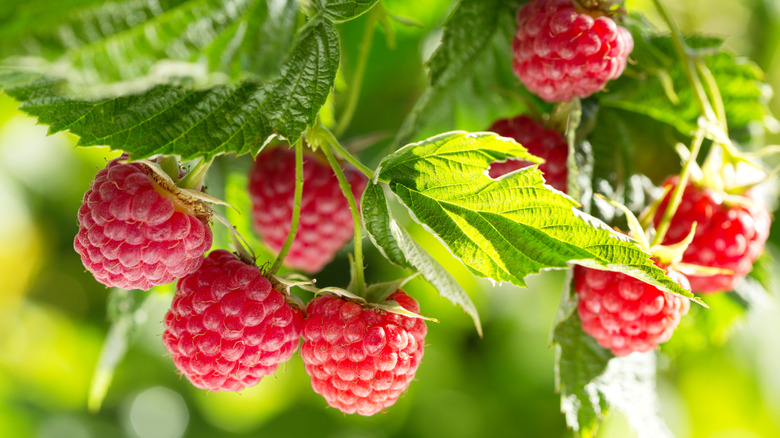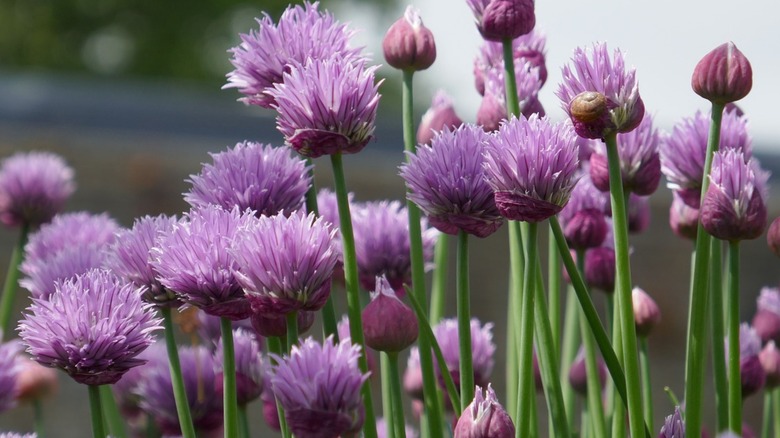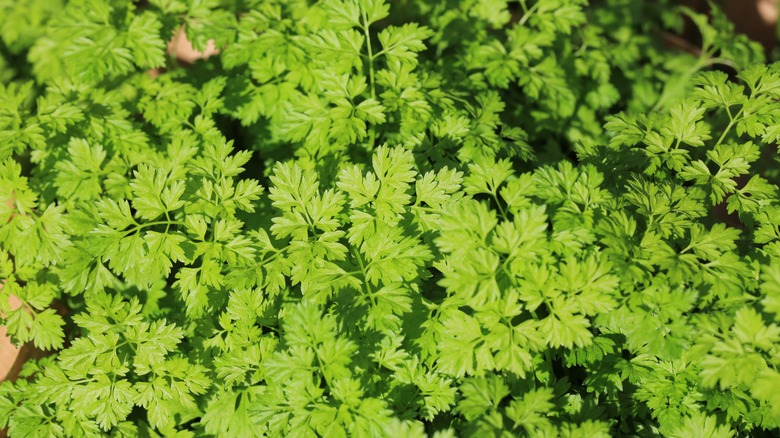Companion Plants That Encourage The Healthiest Home-Grown Raspberries
There's nothing quite like picking fresh fruit straight from your garden and eating it while it still bears the warmth of the sun. Because of the relative ease of growing raspberries compared to some more particular fruits, raspberries are a popular choice for home gardens. Like any other plant, though, there are pests and diseases that can inhibit growth and there are ways to protect your plants and encourage healthy cultivation. One of these positive growth influences is companion planting, which pairs your raspberry bushes with complementary plants that have natural pest repellent traits or antifungal properties. Garlic and other members of the Allium family, as well as other plants like chervil, are all herbs that are good companion plants for raspberries that can help ensure plump, healthy berries for your garden crop.
Japanese beetles are a known menace to raspberries. In truth, the insects feed on more than 300 different types of flowers, fruits, and vegetables across the garden landscape, but raspberry bushes are undoubtedly among their favorites. Grubs will hatch in the soil and feed there, whereas adults will eat away at leaves, giving the leaves a tell-tale skeletal appearance. While most of their damage is cosmetic, you still don't want Japanese beetles in your garden, and companion planting is a subversive, low-maintenance way to deter them.
Alliums between the canes
Raspberries grow on tall canes that can be supported by a trellis or other kind of staking system holding them upright, which helps keep fungus out of the bushes while allowing space for you to plant other herbs in between the canes at ground level. If you pick strong-smelling herbs like Alliums — garlic, chives, ramps, and shallots, to name a few — to plant here, Japanese beetles in the area will forgo your raspberry bushes for a less odorous meal somewhere else. Meanwhile the Alliums will provide a fertile and healthy environment for your raspberries to thrive.
In addition to keeping the Japanese beetles away, Alliums also deter other scent-sensitive pests like rabbits and deer and can be disease-resistant if grown under proper conditions in loamy, well-drained soil. And no matter your skill as a gardener, there are Alliums for every level of expertise– from the easygoing scallion to the persnickety leek. Of course, Alliums can be a wonderful addition to any garden, with or without the benefits of companion planting, but they raise the bar as companion plants.
Raspberries and herbs
Similar to the Alliums in herbaceousness, the French staple chervil is also an excellent companion plant for raspberries. A relative of parsley, chervil has a mild flavor but is distinctly aromatic. Its scent carries notes of anise, which is the scent and flavor of licorice — another strong odor that Japanese beetles and many other raspberry-loving pests take pains to avoid. The young leaves are ready to harvest in the spring, but any you don't use in your kitchen will continue to grow and flower through the summer, bringing yet another benefit to your raspberry bushes.
Above and beyond the insect-repellent properties it shares with Alliums, planting chervil is a great way to attract pollinators to your garden. Because the chervil flowers have such an abundant supply of nectar, insects and birds that feed on it — like honeybees, butterflies, and even hummingbirds — flock to the area, and in doing so, they further pollinate and propagate your raspberries, as well. This will result in a fuller crop that falls victim to fewer pests and fewer diseases. If you're hoping to grow raspberries, companion planting them along with Alliums and chervil is the way to go.


